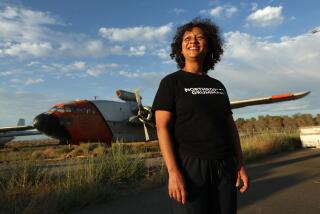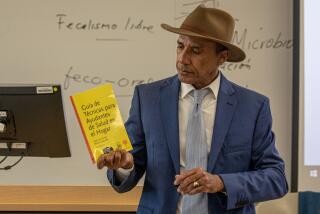HUNTINGTON BEACH : Surprisingly Tough TV Classes Are a Hit
- Share via
After a violent crime left Judy Cushman a paraplegic and ended her nursing career, she was determined to return to college to prepare for a new profession.
She hadn’t yet regained enough strength to regularly maneuver her wheelchair around a campus, though, so she decided to enroll in a full schedule of televised courses offered by Coastline Community College.
“It was great,” Cushman said. “All I had to do is sit here in my wheelchair and watch the telecourses.”
But like many of the estimated 3,000 students each semester who take at least one of the 27 Coast Telecourses offered, Cushman said she discovered that the school-by-TV method is not only convenient but also demanding and rewarding.
“They are difficult. Taking the same course on campus is much easier,” she said, having taken nine of her college courses by television.
Most of the telecourses are introductory-level classes in an array of subject areas, including English, math, psychology, philosophy, business and photography.
About one-third of the courses are produced by Coast Telecourses officials, featuring professors or experts in the subjects being taught. Others are drawn from telecourse programs produced nationwide.
Besides viewing the 26 half-hour televised lessons over 18 weeks, students also use a textbook, a study guide, self-administered quizzes and an instructional handbook. In addition, they attend class at least four times each semester for exam preparation and testing.
“Some students think they’re just going to be watching TV and taking tests,” said Marilyn Kelly, Coast Telecourses’ assistant dean of instruction. “But the text is a major portion of each course. Students can expect to do the same amount of work in a telecourse” as they would in a classroom setting.
But convenience is important to students with tight schedules, such as Cathy Stumpf of Seal Beach, who works full time while pursuing a business management degree at Pepperdine University.
“I’m an advocate of the telecourses,” said Stumpf, who is fulfilling some final general-education requirements this semester by taking sociology and philosophy courses via television.
Although the Coast Telecourses are coordinated through Coastline Community College, students from any community college or university may enroll in the televised courses and receive full, transferable college credit, Kelly said.
Similar telecourse programs are offered in Orange County through Cypress, Fullerton, Rancho Santiago and Saddleback colleges.
Students have several options for viewing the Coast Telecourses.
Two lessons per week are aired at several scheduled times on KOCE, the Golden West College-based public television station, and on the Paragon and Copley Colony cable television stations, which serve viewers in and around northwest Orange County.
Coast Telecourses’ student surveys show that most students videotape the course lessons and view them at their convenience, Kelly said.
Students may also view videocassettes of any of the lessons at seven libraries at or near Coastline’s four instructional sites. Also, individual lesson cassettes or the entire 26-lesson collection are available for rent or purchase.
The telecourse program offers videocassettes to about 700 colleges nationwide, as well as to many overseas institutions in such countries as Australia, Canada, Greece, Ireland, the Netherlands and Taiwan. At most foreign institutions, the cassette lessons are used to supplement classroom courses, said Jim Le May, Coast Telecourses’ marketing manager. Where necessary, those campuses produce cassettes with translations of the lessons.
Since September, five videocassette courses have been offered to enlisted Navy personnel aboard ships or submarines. About 25 Navy men and women are taking courses in such areas as business, psychology and computers by viewing cassettes on board their vessels, Kelly said.
Commitment, however, is important.
“If you’re not motivated, I wouldn’t suggest it,” Stumpf said.
But after taking 10 courses by television during the past three years, Debra Damwijk said, “I wish every subject was offered totally through TV courses.”
More to Read
Sign up for Essential California
The most important California stories and recommendations in your inbox every morning.
You may occasionally receive promotional content from the Los Angeles Times.













